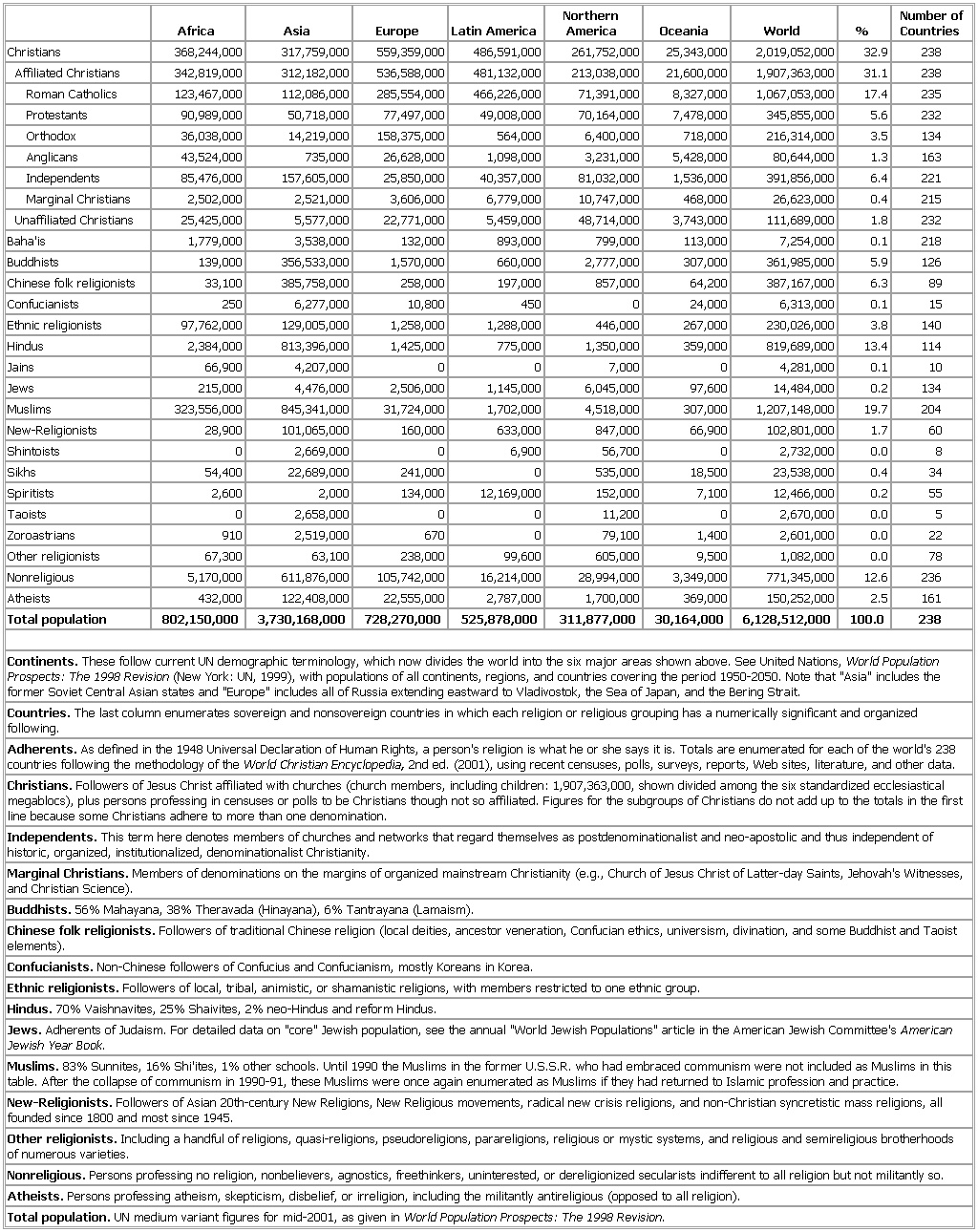- Worldwide Adherents of All Religions by Six Continental Areas, Mid-2001
-
▪ TableWorldwide Adherents of All Religions by Six Continental Areas, Mid-2001CountriesChristians 368,244,000 317,759,000 559,359,000 486,591,000 261,752,000 25,343,000 2,019,052,000 32.9 238Affiliated Christians 342,819,000 312,182,000 536,588,000 481,132,000 213,038,000 21,600,000 1,907,363,000 31.1 238Roman Catholics 123,467,000 112,086,000 285,554,000 466,226,000 71,391,000 8,327,000 1,067,053,000 17.4 235Protestants 90,989,000 50,718,000 77,497,000 49,008,000 70,164,000 7,478,000 345,855,000 5.6 232Orthodox 36,038,000 14,219,000 158,375,000 564,000 6,400,000 718,000 216,314,000 3.5 134Anglicans 43,524,000 735,000 26,628,000 1,098,000 3,231,000 5,428,000 80,644,000 1.3 163Independents 85,476,000 157,605,000 25,850,000 40,357,000 81,032,000 1,536,000 391,856,000 6.4 221Marginal Christians 2,502,000 2,521,000 3,606,000 6,779,000 10,747,000 468,000 26,623,000 0.4 215Unaffiliated Christians 25,425,000 5,577,000 22,771,000 5,459,000 48,714,000 3,743,000 111,689,000 1.8 232Baha'is 1,779,000 3,538,000 132,000 893,000 799,000 113,000 7,254,000 0.1 218Buddhists 139,000 356,533,000 1,570,000 660,000 2,777,000 307,000 361,985,000 5.9 126Chinese folk religionists 33,100 385,758,000 258,000 197,000 857,000 64,200 387,167,000 6.3 89Confucianists 250 6,277,000 10,800 450 0 24,000 6,313,000 0.1 15Ethnic religionists 97,762,000 129,005,000 1,258,000 1,288,000 446,000 267,000 230,026,000 3.8 140Hindus 2,384,000 813,396,000 1,425,000 775,000 1,350,000 359,000 819,689,000 13.4 114Jains 66,900 4,207,000 0 0 7,000 0 4,281,000 0.1 10Jews 215,000 4,476,000 2,506,000 1,145,000 6,045,000 97,600 14,484,000 0.2 134Muslims 323,556,000 845,341,000 31,724,000 1,702,000 4,518,000 307,000 1,207,148,000 19.7 204New-Religionists 28,900 101,065,000 160,000 633,000 847,000 66,900 102,801,000 1.7 60Shintoists 0 2,669,000 0 6,900 56,700 0 2,732,000 0.0 8Sikhs 54,400 22,689,000 241,000 0 535,000 18,500 23,538,000 0.4 34Spiritists 2,600 2,000 134,000 12,169,000 152,000 7,100 12,466,000 0.2 55Taoists 0 2,658,000 0 0 11,200 0 2,670,000 0.0 5Zoroastrians 910 2,519,000 670 0 79,100 1,400 2,601,000 0.0 22Other religionists 67,300 63,100 238,000 99,600 605,000 9,500 1,082,000 0.0 78Nonreligious 5,170,000 611,876,000 105,742,000 16,214,000 28,994,000 3,349,000 771,345,000 12.6 236Atheists 432,000 122,408,000 22,555,000 2,787,000 1,700,000 369,000 150,252,000 2.5 161Total population 802,150,000 3,730,168,000 728,270,000 525,878,000 311,877,000 30,164,000 6,128,512,000 100.0 238Continents. These follow current UN demographic terminology, which now divides the world into the six major areas shown above. See United Nations, World Population Prospects: The 1998 Revision (New York: UN, 1999), with populations of all continents, regions, and countries covering the period 1950-2050. Note that "Asia" includes the former Soviet Central Asian states and "Europe" includes all of Russia extending eastward to Vladivostok, the Sea of Japan, and the Bering Strait.Countries. The last column enumerates sovereign and nonsovereign countries in which each religion or religious grouping has a numerically significant and organized following.Adherents. As defined in the 1948 Universal Declaration of Human Rights, a person's religion is what he or she says it is. Totals are enumerated for each of the world's 238 countries following the methodology of the World Christian Encyclopedia, 2nd ed. (2001), using recent censuses, polls, surveys, reports, Web sites, literature, and other data.Christians. Followers of Jesus Christ affiliated with churches (church members, including children: 1,907,363,000, shown divided among the six standardized ecclesiastical megablocs), plus persons professing in censuses or polls to be Christians though not so affiliated. Figures for the subgroups of Christians do not add up to the totals in the first line because some Christians adhere to more than one denomination.Independents. This term here denotes members of churches and networks that regard themselves as postdenominationalist and neo-apostolic and thus independent of historic, organized, institutionalized, denominationalist Christianity.Marginal Christians. Members of denominations on the margins of organized mainstream Christianity (e.g., Church of Jesus Christ of Latter-day Saints, Jehovah's Witnesses, and Christian Science).Chinese folk religionists. Followers of traditional Chinese religion (local deities, ancestor veneration, Confucian ethics, universism, divination, and some Buddhist and Taoist elements).Confucianists. Non-Chinese followers of Confucius and Confucianism, mostly Koreans in Korea.Ethnic religionists. Followers of local, tribal, animistic, or shamanistic religions, with members restricted to one ethnic group.Hindus. 70% Vaishnavites, 25% Shaivites, 2% neo-Hindus and reform Hindus.Jews. Adherents of Judaism. For detailed data on "core" Jewish population, see the annual "World Jewish Populations" article in the American Jewish Committee's American Jewish Year Book.Muslims. 83% Sunnites, 16% Shi'ites, 1% other schools. Until 1990 the Muslims in the former U.S.S.R. who had embraced communism were not included as Muslims in this table. After the collapse of communism in 1990-91, these Muslims were once again enumerated as Muslims if they had returned to Islamic profession and practice.New-Religionists. Followers of Asian 20th-century New Religions, New Religious movements, radical new crisis religions, and non-Christian syncretistic mass religions, all founded since 1800 and most since 1945.Other religionists. Including a handful of religions, quasi-religions, pseudoreligions, parareligions, religious or mystic systems, and religious and semireligious brotherhoods of numerous varieties.Nonreligious. Persons professing no religion, nonbelievers, agnostics, freethinkers, uninterested, or dereligionized secularists indifferent to all religion but not militantly so.Atheists. Persons professing atheism, skepticism, disbelief, or irreligion, including the militantly antireligious (opposed to all religion).Total population. UN medium variant figures for mid-2001, as given in World Population Prospects: The 1998 Revision.See as table:

* * *
Universalium. 2010.
